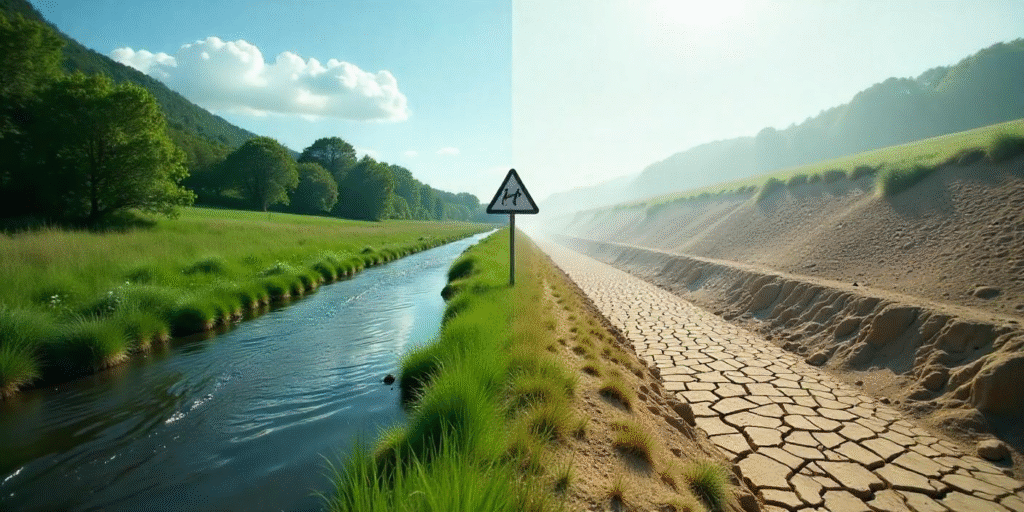Imagine this: you’re making your morning tea, you twist the tap, and—nothing. Just a dry hiss. No water. No warning.
Sounds like a scene from a dystopian film, right? Unfortunately, this could be a reality for the UK by the mid-2030s, according to recent government warnings. And if it can happen in a country as developed as the UK, what’s stopping the rest of us from following the same path?
Let’s break this down. This isn’t just a British issue. It’s a clear red flag for countries around the world, especially those already struggling with water scarcity—like India. As a water treatment company, we at Genviss find this not just concerning, but also deeply relevant to our work.
What’s Happening in the UK?
The alarm bells were rung loud and clear by Emma Hardy, the UK’s new Water Minister. She warned that Britain could run out of drinking water within the next decade if immediate action isn’t taken.
How did it come to this?
Well, part of the issue is shockingly simple: no major reservoir has been built in England in over 30 years. That’s three decades of growing population, rising consumption, and shrinking rainfall—without expanding the infrastructure to store water.
Even with all their technology and resources, the UK failed to keep up. And now the cracks are starting to show—quite literally. According to The Times UK, certain regions in the south and east are already under severe water stress.
What’s Being Done Now?
Better late than never, right?
After years of delay, the UK government has finally approved two massive reservoir projects—one in East Anglia and another in Lincolnshire. These will be the first new reservoirs in over three decades, aiming to supply over 750,000 homes in water-stressed regions.
But this is just a small piece of the puzzle. These projects are part of a much larger £104 billion investment in the UK water sector, which includes:
- Upgrading outdated infrastructure
- Repairing leaks (the UK loses millions of litres daily to leaks)
- Promoting sustainable water management
- Investing in recycling and reusing water
You can read more about this move on The Guardian’s article that covers the government’s recent green light to reservoir projects.
Why Should the Rest of the World Care?
Because what’s happening in the UK is just a preview of what’s already underway globally. Let’s take India for instance—cities like Chennai, Bengaluru, and even Delhi have all faced day-zero threats in recent years. The groundwater tables are depleting. Rivers are drying up. And urban expansion is not slowing down.
And let’s not forget climate change. Rain patterns are more unpredictable than ever. When rain does fall, it pours all at once—and then nothing for weeks. This makes water storage and treatment infrastructure more critical than ever.
If a well-funded, technologically advanced country like the UK could go 30 years without building a reservoir, what about countries that lack even basic water governance?
The lesson is simple: we cannot wait for a crisis to act.
Key Lessons for India and Beyond
1. Long-Term Thinking Over Short-Term Fixes
Building a reservoir takes time, planning, and massive resources. That’s why many governments keep kicking the can down the road. But as we’re seeing, that strategy doesn’t end well.
India, for example, needs to take a cue and start planning infrastructure today that will be essential in the 2040s and 2050s.
2. Focus on Both Supply and Demand
Adding more water through new projects is great. But managing demand is equally important. This includes reducing leakages, promoting water reuse, and educating the public about water conservation.
3. Private Sector Involvement
This is where companies like Genviss play a crucial role. From water recycling plants to advanced RO systems and community-level purification units, the private sector can help close the gap quickly and efficiently.
How Genviss Fits Into This Global Challenge
At Genviss, we’ve always believed that water is too important to be taken for granted. Whether we’re working with residential projects, industries, or municipalities, our goal is the same: to make water cleaner, safer, and more available.
Some of the solutions we offer include:
- Compact sewage treatment plants (STPs) for urban housing
- Industrial water recycling solutions for factories
- Rainwater harvesting systems
- Custom water softening and RO plants for high-TDS regions
And we don’t stop at just selling equipment—we also help our clients design future-ready water strategies that stand strong for decades to come.
One Eye on the Future
If we take one clear insight from the UK’s crisis, it’s this:
Water crises don’t begin when taps run dry. They begin years earlier, when we fail to plan.
Governments, industries, and individuals need to move from reactive to proactive thinking. Every new housing society, every new industry, every municipal project needs to ask: “What’s our water strategy for the next 30 years?”
Because when water’s gone, there are no quick fixes.
Final Thoughts
The UK’s water crisis isn’t just a headline—it’s a preview. It’s a stark reminder that water security is no longer a distant issue. It’s today’s issue.
We’re lucky here in India to still have options. But unless we plan, innovate, and act now—those options will dry up faster than we think.
At Genviss, we’re ready to do our part. Are you?

